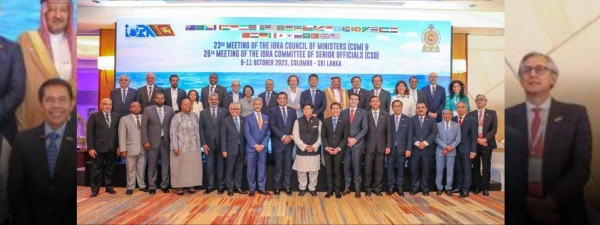
The maritime remedies necessary to tackle the threats posed by Iran and its proxies in the waters around the Arabian Peninsula need to be forward-looking and have an edge. With a growing threat to maritime logistics, it is time to think about the broader picture. The Iranian proxy threat network in the maritime arena is a clear and present danger. Aggressive asymmetrical attacks and the spread of advanced drone and engine proliferation are making these Arabian seas highly dangerous.
Lessons learned from previous maritime threats can be taken into consideration. The manner in which states responded to piracy in key maritime routes — from the Gulf of Guinea to the Horn of Africa and the Strait of Malacca — established a model for contending with maritime threats. Convoys in specific sea lanes are a popular method of protection. It should also be recalled that the EU Naval Force launched airstrikes on pirate enclaves in 2012.
The causes of piracy across the regions mentioned above are tied to local socioeconomic conditions. The resulting efforts in macro and micro-financing projects and local maritime training helped to stop the demand for pirate activity by substituting illicit revenue with improvements in infrastructure. The security protection industry that developed around maritime security grew too, and specialized maritime security protection services are now part of the industrial landscape as a means of protecting marine transport.
But the Iranian threat against maritime shipping now involves asymmetrical tools such as short-range missiles, drones and limpet mines. The requirements to guard against such threats require an appreciation of other factors when mitigating threats across three plains or aspects.
The first aspect involves the maritime environment itself. The waters around the Arabian Peninsula — the Red Sea, Gulf of Aden, Gulf of Oman and, of course, the Strait of Hormuz — contain thousands of dhows of various sizes, as well as medium and large vessels and tankers. It is the dhow traffic that is the most difficult part of the puzzle, because the sheer number of such vessels currently outweighs the capability to monitor them. The ability for Iran and its proxies to deliver support to the Houthis to increase their technical capability and allow them to strike Saudi and American targets on land, at sea and in the sky is only possible because of the continuing ability for this network to exist. In this sense, maritime security begins on land and the sources of the threat’s capabilities need to be severed. A greater use of surveillance capabilities and monitoring, plus an increase in information sharing on specific port and maritime sea lanes, would certainly be a good start as aggressive reconnaissance is required. A regional port operators security group is key.
The second aspect goes beyond the additional deployment of US, UK and other forces into the region for maritime security, with additional observation and protection capabilities. The time is now to put all those maritime exercises between the US, UK and Gulf states to use. The reason why is that regional navies need to step up their efforts to fill the gaps in coastal protection, and also to become more fully integrated into the maritime security picture. Part of the remedy here is better use of technology: Filling those gaps requires additional solutions involving unmanned underwater vehicles and other advanced acoustic devices for forensic collection and identification. Here a coordinated effort must be used to bring about the desired results, such as better mapping of maritime assets in the region to identify threats faster. The flow of logistical chains around the Arabian Peninsula must be kept moving. This step is part of the emerging picture regarding escorting high-value vessels and protecting energy platforms, bunkering locations, and navigation lanes.
Regional navies need to step up their efforts to fill the gaps in coastal protection.
Dr. Theodore Karasik
The third aspect is the maritime logistics and insurance industries. Rates are already rising fast. What comes next will need to be handled with care by these industries, coordinating now instead of fighting over premiums and addendum. Again, information sharing is necessary — maybe mandatory — for transparency in the market as coverage rates shoot up. There is also the necessity, if maritime events enter a violent phase with drastic results, the reinsurance industry must be ready to play its role. The regional port operators group mentioned above would be required to interface more directly with these industries. Finally, it needs to be remembered that, as vessels are hit, the country and/or company impacted will be making claims that may go against immediate forensic evidence because of pending claims and their arguments. The politics of this specific landscape requires close observation.
Naturally, the environment is also a concern in these waterways. Iran and its proxies are able to make a toxic mess. Smoke, debris and chemical spills are the refuse of terrorist mayhem in the maritime arena. This delicate environment is part of the local diet. The ability to contain the spread of pollutants as a result of any successful attack on shipping or related infrastructure requires the latest technology. The role of crisis management and civil defense will be important too.
Overall, the maritime security environment around the Arabian Peninsula needs to coalesce around cooperation in logistics and the prevention of attacks. This mission requires cooperation and coordination in terms of the geopolitical picture involving logistical chains. Corporate entities with corporate social responsibility departments need to create joint programs with government partners for rapid information exchange in a coordinating “cell.” This effort needs to go beyond previous attempts and current efforts. The full participation of all states and corporate interests is mandatory in protecting the littoral states of the waters around the Arabian Peninsula. By advancing maritime security objectives and remedies beyond the military arena, Iran and its proxies can be pushed back so that shipping remains free and clear.












